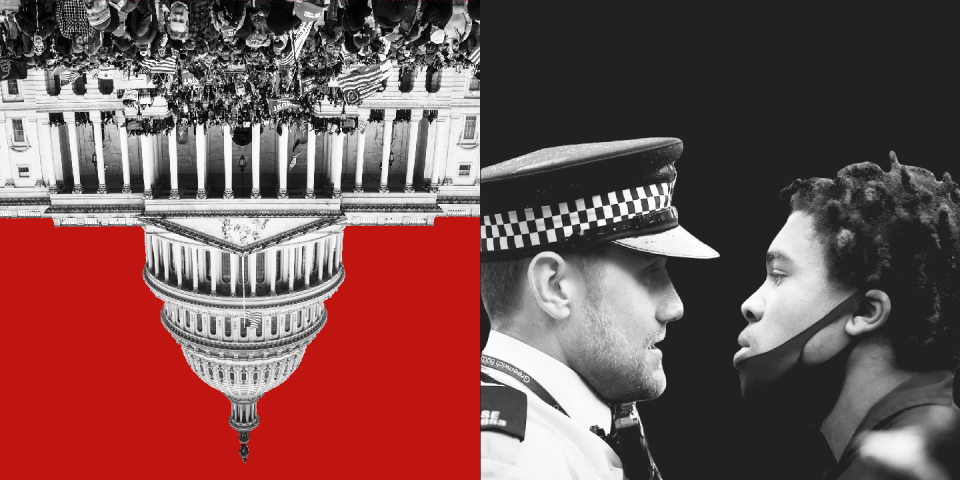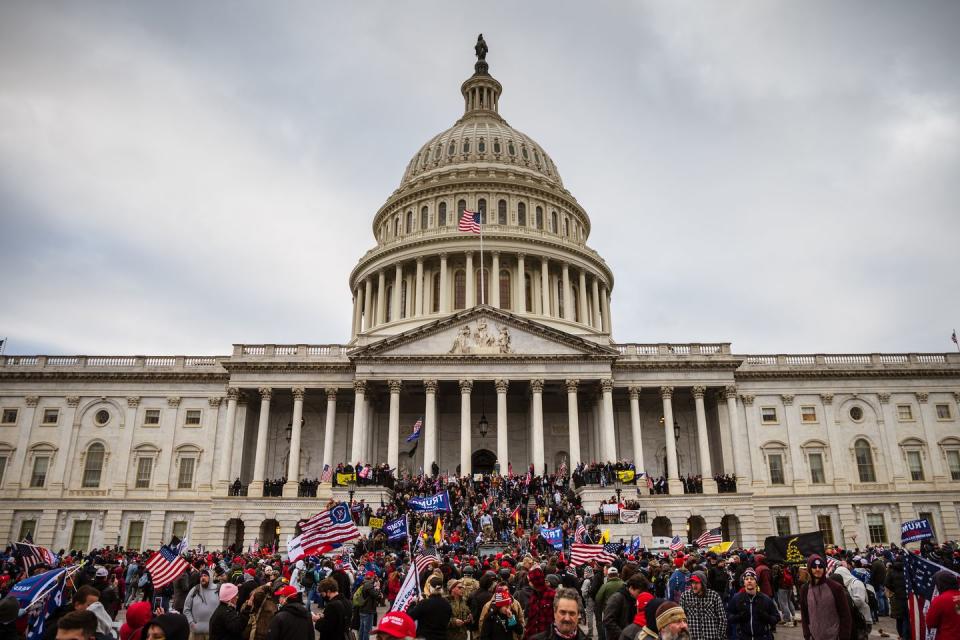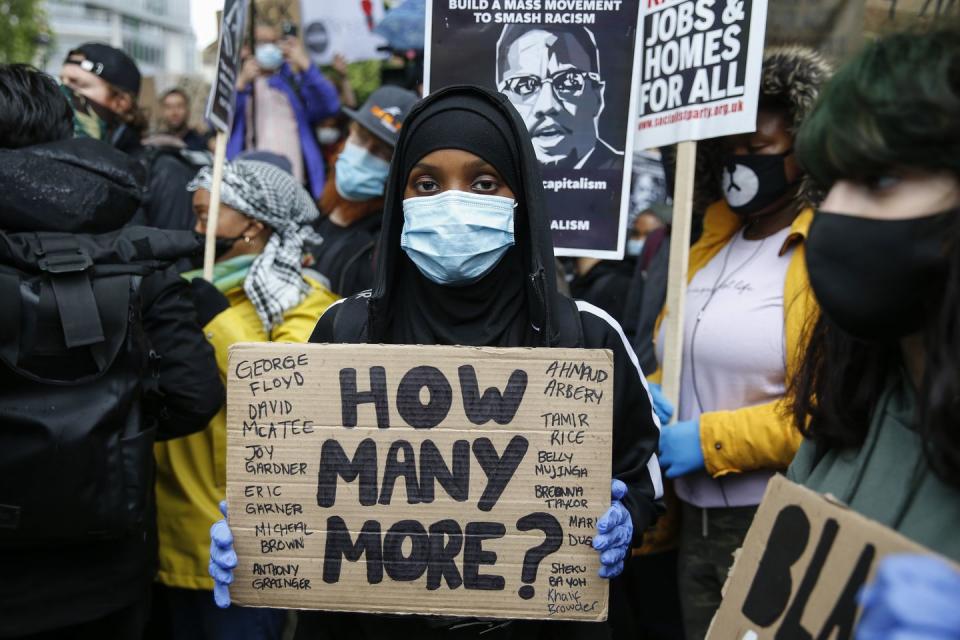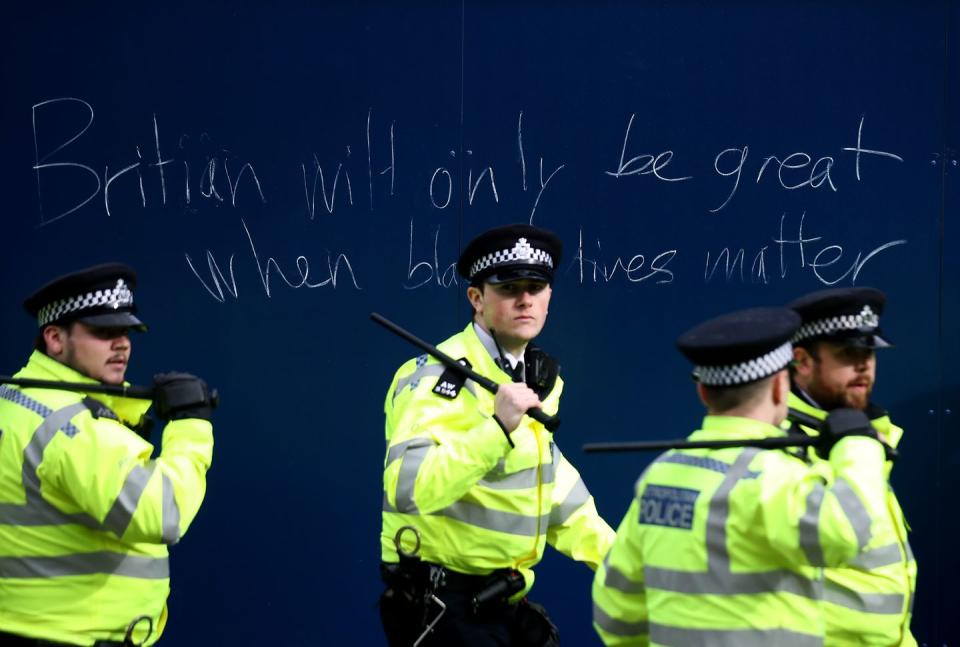‘The UK Is Not Far Off’ – The Capitol Riots Were A Hint At What Could Be In Store For Britons

‘This is what democracy looks like.’ These words have long been the rallying cry of the Black Lives Matter movement. They were chanted for days on end in Ferguson, Missouri, in 2014 after a Black teenager, Michael Brown, was fatally shot by a police officer. Last summer, they echoed around the globe when hundreds of thousands of protesters took to the streets to demand justice for Black lives following the killings of George Floyd and Breonna Taylor at the hands of the authorities.
For most people, the mob of Trump supporters who stormed the US Capitol Building earlier this month provided a clear illustration of what democracy does not look like. Rioters scaled the walls of the government building, desecrated offices, urinated on its steps, and even posed for selfies with police officers who were largely trying to keep insurrectionists away. The rioters highlighted not just the gravity of the threat posed by MAGA supporters and the far-right, but also the deeply embedded institutionalised racism that can fester in a ‘free’ country.
Watch: How chaos at the Capitol exposed a double standard
At the presidential inauguration on Wednesday 20 January, all eyes will be on the Capitol once again as President-elect Joe Biden and Vice-President-elect Kamala Harris take to the stage, side by side. If they had stormed the Capitol that day, however, the two politicians may have been treated very differently by security forces. As history has proven, Harris – a Black woman – would most likely have been met at the riots with assault rifles, tear gas and battle helmets. Biden, on the other hand, might have had the chance to sit atop House Speaker Nancy Pelosi’s chair and left unharmed.
As is the case following incidents of social unrest, the ramifications of the Capitol Hill riots reach far beyond the US. They demonstrated just how easily a group of mainly white, far-right protesters can occupy the seat of a government’s democracy, all while claiming that their own actions are democratic. Like many of their US counterparts, Black communities in the UK have experienced anger and frustration at the events of Capitol Hill. Activist and model Munroe Bergdorf called attention on Twitter to how Black people are ‘not listened to until there is a wholly preventable but also massively disgusting incident’, while actress Thandie Newton cited the ‘undeniable truth’ that if the protesters had been Black, they would have been imprisoned or killed.

‘I couldn’t sleep that night, because I was thinking, “What is valuable life?” Do police just see skin colour and they’re like, “OK, you get to live?”’ wonders Jaylene Mbararia, an activist and philosophy student at the University of Edinburgh. Mbararia posted on Instagram the day after the riots, commenting on the ‘violence of whiteness as a concept’. The backlash she received was immediate. ‘I had so many messages from white supremacists. They were like, “This post is racist.” They were saying horrible, racist things to me.’ The following day, her post was removed from the platform for ‘hate speech’.
From the prejudiced backlash to Channel 4’s broadcast of a Sainsbury’s advert featuring a Black family last month to actor John Boyega’s speculation that casting directors might think he had caused ‘too much friction’ after delivering a speech at a Black Lives Matter protest months prior, the last year has shown that simply speaking up against racism has consequences for Black communities, no matter which side of the pond you reside. Naomi Smith, who co-organised the protest of more than 20,000 in London where Boyega spoke, recalls listening to a UK-based radio presenter speaking about the event the next day.
‘He was talking about us being thugs, and how we broke social distancing rules… just all sorts of negative things,’ she says. ‘The worst thing is, if you were there, and if you actually watched the news… it was such a successful, peaceful day.’ Smith notes that the word ‘thug’ has since stuck with her, adding: ‘If you consistently use certain words to represent Black people, they’ll always be seen that way.’

The use of such potent language, Smith says, hasn’t been used to solely describe Black Lives Matter protesters but equally supporters of the far-right figure and co-founder of the English Defence League, Tommy Robinson. And herein lies the problem.
In response to the BLM protests in June 2020, Robinson called on his followers to protect the statue of Winston Churchill in Parliament Square, London. Rioters were seen clashing with police officers, desecrating a memorial and shouting racist slurs at Black activists. Reacting to the BLM protests, Home Secretary Priti Patel dubbed the protestors – who remained largely peaceful and anti-violence – ‘thugs and criminals’, with prime minister Boris Johnson noted that the demonstrations were ‘subverted by thuggery’. An almost identical rhetoric was used when describing Robinson’s supporters’ actions, with Johnson noting them to be ‘racist thuggery’, while Patel called the group ‘far-right thugs’. Journalist Martin Fletcher wrote in the New Statesman at the time that Johnson even went as far as equating BLM protesters to far-right rioters. ‘These marches and protests have been subverted by violence,’ the PM tweeted at the time. Johnson joined a queue of critics who tarred BLM protesters and EDL rioters with the same brush, despite their vastly different intentions and actions.
Such a lack of differentiation between groups at opposite ends of the belief spectrum and resistance to call out anti-democracy was similarly highlighted in the US after the Capitol riots. For hours on January 6, news outlets such as the BBC and NBC News seemingly struggled on whether to refer to rioters as ‘protesters’, ‘thugs’ or ‘a mob’, just as some in the UK have previously referred to Tommy Robinson as an ‘activist’.
Femi Nylander of the Rhodes Must Fall movement in Oxford, which demands the removal of a statue commemorating imperialist Cecil Rhodes, says that while the language used to describe protesters and rioters may not have differed, the police’s response to them in the UK certainly did.
‘There was a lot of police repression and manhandling and misplaced arrests when the BLM movement started a fairly peaceful protest in London but when the [far-right protest] got violent and involved some of these fringe far-right people even assaulting police officers and the rest, they were much more leniently treated,’ Nylander claims. A report by the Network for Police Monitoring, released in November, revealed that the policing of the Black Lives Matter protests in the UK was ‘institutionally racist’, with officers using kettling (also known as containment or corralling), as well as ‘baton charges, pepper spray and violent arrest’.
Following the Capitol riots, many on social media have decried the state of affairs across the pond, claiming ‘the UK isn’t far off’ and comparing Johnson to Trump. David Lammy, the Labour MP for Tottenham, recently highlighted that Johnson had previously suggested that Trump, who has been impeached for a second time after inciting the riots, be nominated for the Nobel Peace Prize. Nylander believes ‘the far-right in the UK has been seeing what’s going on in the US and been thinking, “There’s room for us to do the same”.’

Just how likely, then, is an insurrection in the UK? (As seen in the US as a response to the upcoming presidential transition.) According to Dr William Allchorn, who is a researcher and professor of far-right movements at the University of Leeds, the murder of MP Jo Cox during the EU referendum campaign in 2016 was ‘a watershed moment of similar magnitude’ to the Capitol riots. He also points to 2016 as the start of a new ‘vein of identity politics’ that could lead to ‘anti-minority violence more generally being a thing going forward’.
Indeed, a report by anti-fascist campaign group Hope Not Hate found that the UK far-right was becoming ‘more racist’ in the aftermath of the BLM movement. ‘What’s been worrying since the Black Lives Matter protests and this whole debate around statues has been the emergence of some more white nationalist discourse around the biology of race, talking about white marginalisation, white victimhood,’ Allchorn adds, noting the UK far-right has also been ‘feeding off’ misinformation from the US, and vice versa. According to Sky News, the US far-right group the Proud Boys, who were among the Capitol rioters, has links with Tommy Robinson and the EDL.
For social commentator and Windrush campaigner Patrick Vernon, the UK even lags behind the US in some respects, as it is ‘still light years away from having a Black person or a person of colour to be Prime Minister’. He says the actions of the country’s leadership sets the tone for the rest of the population. ‘If you’re in a position of authority and you use certain language, certain behaviour, that gives permission for people to do things which they would have done anyway, ,’ he adds, citing how Enoch Powell, former Secretary of State for Health, ‘gave legitimacy to the far-right’ in the 1960s with his ‘Rivers of Blood’ speech criticising immigration.

Vernon believes Britain has missed opportunities to tackle racism for far too long, particularly following the murder of Stephen Lawrence in 1993. A public shift occurred when a report on the murder investigation was released in 1999, revealing ‘institutional racism’ had impeded the inquiry. ‘That was 20-odd years ago,’ he notes. Fast forward to earlier this month and a Black man, Mohamud Hassan, died in police custody in Wales, with Black Lives Matter protests taking to the streets once more demanding the end of police brutality. ‘The question is, when is Britain going to acknowledge that it wants to work towards being anti-racist?’ Vernon asks.
Looking at the Capitol riots, Smith says she doesn’t ‘doubt for a minute that people in the UK could do the same’. As in the US, if the storming of a government building took place in the UK, she thinks the reaction of the British security forces would depend entirely on the race of the rioters. For white rioters, there would be arrests, she predicts. As for the Black rioters: ‘There would be a sea of dead bodies, without a doubt.’
Mbararia says she has been worrying about the far-right much more since the widespread racist reactions to BLM protests last summer. As a result, she believes an insurrection is ‘semi-inevitable’ in the current political climate. ‘It’s not if, it’s more when,’ she adds.
Watch: Proud Boys member tied to Capitol riots leaves court
You Might Also Like

